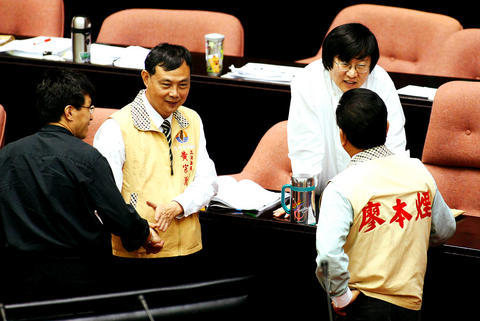Former Taiwan Solidarity Union (TSU) legislators Liao Pen-yen (
"They said that we were not following the TSU's spirit and policies, so we needed to go. What kind of reason is that?" Liao said at a press conference at the legislature yesterday morning.
The TSU's Central Executive Committee decided on Monday to expel the pair.

PHOTO: CNA
"They never talked to us and they never told us what we had done wrong or which party rule we broke. It is not fair to kick us out just like that," Liao said.
"They said that I did not follow the TSU's spirit and policies? Excuse me, but I am one of the five founders of the TSU. I have been the acting chairman for more than two months. Who knows the party's spirit and policies better than I?" Huang said.
TSU caucus whip Lo Chih-ming (
"I am sorry to see them go. I wish the party headquarters would give them a chance to appeal," Lo said. "But if not, I hope they find a new team soon."
TSU Legislator Lin Jih-jia (
"They have not participated in any caucus meetings or discussions since September. I think that is the main reason why other people would believe that they do not care about the TSU anymore," Lin said.
Meanwhile, the Democratic Progressive Party (DPP) downplayed the TSU move, saying that it respected its ally's system.
DPP presidential candidate Frank Hsieh (謝長廷) told a press conference at party headquarters that he was not in a position to comment because he did not know whether the dismissal had anything to do with his party.
"We respect their democratic system and autonomy," he said.
DPP Secretary-General Cho Jung-tai (卓榮泰) said that he was "surprised" by the TSU's decision but that it was "impolite" for the DPP to comment on the matter now because the two legislators can still appeal the move.
The pair can appeal to the TSU's Arbitration Committee within 10 days of receiving written notice of the expulsion.
When asked whether the DPP would ask the pair to join the party, Cho said that it had not asked them to join.
The parties have agreed that the DPP will not nominate candidates in the constituencies where the two TSU legislators will stand in January's legislative elections and that the DPP will work to help them win.
Cho said the pair's expulsion would not affect the inter-party negotiations about nominations in other constituencies.
There are many ways for the two parties to cooperate, Cho said, and opinions polls will be the last resort.
DPP Legislator Hsieh Hsin-ni (謝欣霓), director of the party's Culture and Information Department, said that she was "astonished" at the news.
It is up to the TSU whether they want to nominate people to replace Liao and Huang, she said, but this was not a good time to say whether the DPP would try to recruit them.

Alain Robert, known as the "French Spider-Man," praised Alex Honnold as exceptionally well-prepared after the US climber completed a free solo ascent of Taipei 101 yesterday. Robert said Honnold's ascent of the 508m-tall skyscraper in just more than one-and-a-half hours without using safety ropes or equipment was a remarkable achievement. "This is my life," he said in an interview conducted in French, adding that he liked the feeling of being "on the edge of danger." The 63-year-old Frenchman climbed Taipei 101 using ropes in December 2004, taking about four hours to reach the top. On a one-to-10 scale of difficulty, Robert said Taipei 101

Nipah virus infection is to be officially listed as a category 5 notifiable infectious disease in Taiwan in March, while clinical treatment guidelines are being formulated, the Centers for Disease Control (CDC) said yesterday. With Nipah infections being reported in other countries and considering its relatively high fatality rate, the centers on Jan. 16 announced that it would be listed as a notifiable infectious disease to bolster the nation’s systematic early warning system and increase public awareness, the CDC said. Bangladesh reported four fatal cases last year in separate districts, with three linked to raw date palm sap consumption, CDC Epidemic Intelligence

US climber Alex Honnold left Taiwan this morning a day after completing a free-solo ascent of Taipei 101, a feat that drew cheers from onlookers and gained widespread international attention. Honnold yesterday scaled the 101-story skyscraper without a rope or safety harness. The climb — the highest urban free-solo ascent ever attempted — took just more than 90 minutes and was streamed live on Netflix. It was covered by major international news outlets including CNN, the New York Times, the Guardian and the Wall Street Journal. As Honnold prepared to leave Taiwan today, he attracted a crowd when he and his wife, Sanni,

Taiwanese and US defense groups are collaborating to introduce deployable, semi-autonomous manufacturing systems for drones and components in a boost to the nation’s supply chain resilience. Taiwan’s G-Tech Optroelectronics Corp subsidiary GTOC and the US’ Aerkomm Inc on Friday announced an agreement with fellow US-based Firestorm Lab to adopt the latter’s xCell, a technology featuring 3D printers fitted in 6.1m container units. The systems enable aerial platforms and parts to be produced in high volumes from dispersed nodes capable of rapid redeployment, to minimize the risk of enemy strikes and to meet field requirements, they said. Firestorm chief technology officer Ian Muceus said